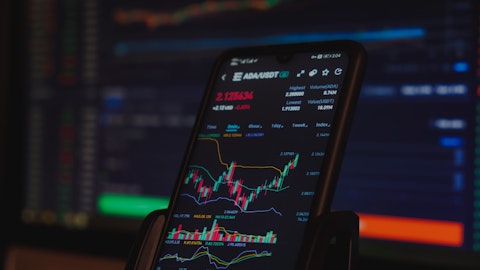Alexander Blostein: Got it. All right. We’ll stay tuned for — when Harvey is on.
William Conway: Thank you. You know Harvey? Do you know Harvey?
Alexander Blostein: I have met Harvey, yes.
William Conway: Okay. Good. I just — I didn’t know whether or not another Goldman Sachs person might weigh in and what a great guy he is.
Alexander Blostein: My quick follow-up for you guys was around Fortitude. That’s something you mentioned in your prepared remarks as well. And I think, Curt, you highlighted some new growth initiatives within that, that can kind of help expedite some of the growth as well. Can you expand on that a bit as well?
Curtis Buser: Sure, Alex. So look, Fortitude has got $50 billion, $51 billion of AUM. The way we’ve set up the services arrangement, we fee off of all of that. In addition, they’ve invested about 9 — or I should say, committed about $9 billion into our funds. So all of that has been working as planned. They also have about $3.5 billion to $4.5 billion of excess capital, which positions them nicely to continue to grow, very active pipeline, working really hard on that. We’ve said before that we fully expect that to be — for them to be able to double in size because of that and fully expect that, that will occur. And when we have more to be able to say on those fronts, we’ll be sure to mention that to you. But we remain very optimistic about kind of how Fortitude can continue to benefit Carlyle.
William Conway: I’d also tell you that Fortitude has — we have 4 or 5 institutional partners who are in that business and are fellow shareholders with us in Fortitude. And they have been fabulous partners helping us grow that business. For us, it still is — we got a lot of capital invested, but we have less than we otherwise would, thanks to those great partners we have. And as Curt said, we do expect to double that business over the next few years at least.
Operator: Our next question comes from Patrick Davitt with Autonomous Research.
Patrick Davitt: I wanted to get a little bit more on the CP — this PE fundraising issues. Could you maybe update us — I know it’s early in the year, but update us on the tone of the conversations with LPs? Are you starting to see people kind of step back into PE more broadly? And thoughts on maybe a more specific time line for when we can see some more chunky closings in those large flagship funds? And then maybe through the lens of all that, is it fair to say 4Q is about as bad as you think it could get in that line?
Curtis Buser: Patrick, let me start on this, but I’m always sensitive about trying to read into the minds of others or really try to figure this out in detail. Look, we have great relations with our LP investors. I think they’re pleased with what we’re doing. A lot of our portfolio performance has been just fantastic and well constructed. And as I already went through a litany of things in terms of what we’ve done well, $145 billion of capital formation in the past 2 years, I think that we can continue to do that in terms of growing and looking, we’ll continue to look at organic things. So look, I think the tone is good, but it’s still difficult in different places. And tone, you got to be specific related to kind of individual situations in the given fund and the like. And there’s a lot of reasons to be optimistic as we start ’23. So Bill, I don’t know if you have anything to add to that?
William Conway: No more specifics to give at this time, Curt. Sorry.
Operator: Our next question comes from Kenneth Worthington with JPMorgan.
Kenneth Worthington: Maybe first, private markets investing in energy. As you start to come back to market with more of these funds, how does the better environment in energy mesh with pension fund community that seems more reluctant to invest further in traditional energy? And what does this mean for your ability to grow your energy franchise in what seems like a more constructive energy environment?
Curtis Buser: Ken, well said. I mean, I do think that we’re optimistic on the energy platforms. Our partners and colleagues at NGP are excited about their opportunities. They’ve got a fund in the market now. I don’t want to comment specifically on that, but expecting good things out of that. Our renewables platform, our power business, our international energy platform all give us a number of products, but they’re not all in the market. But you’re right. Right now, there’s a lot of good opportunity in energy, but different LPs based on their constituencies have different perspectives. The limited experience that we have is that generally, we’re seeing a nice uptick from the existing investors in existing product, which is different than kind of going after new or different, but it’s a good opportunity at the present time.
William Conway: And I think its returns are pretty uncorrelated with all the other returns available in the market, too, and that appeals to a certain group of investors as well.
Kenneth Worthington: Okay. So do you — are you — do you think the business can grow? Or does it just sort of stay here as those 2 trends offset each other?
Curtis Buser: Look, the needs are really significant. I think a lot of that has played out. And so it’s too early, Ken, to really call that definitively. But look, I feel a whole heck of a lot better about that whole sector than say, 2 years ago where it felt a lot more difficult. Right now, everything, performance and the chance forward on a lot of those different aspects, I think, are really, really good.
Kenneth Worthington: And then equity comp fell a bunch during the quarter. What drove it? And I assume we see that sort of snap back next year?
Curtis Buser: Yes. That’s — look, like a lot of things in this business, looking at any individual quarter is a mistake. You got to look at it over a longer period of time. The fourth quarter had some unusual things in it. Essentially, our fourth quarter is always a little bit light because you’ve completed a vesting of a big tranche in the third quarter. And you haven’t granted anything new that occurs in February. So the fourth quarter is naturally a low quarter, plus we had some performance units for some senior folks that didn’t fully there that had been accrued prior in the year. So the fourth quarter was a little bit light. I do think you’re going to see a significant uptick in our equity-based comp next year in 2023, both — we’ve made some big grants in February, just a number of our key people and to ensure retention and make sure to reward people that have performed really well and then also bringing on Harvey, and that will also have an increase in our equity-based comp in 2023.
Operator: Our next question comes from Brian McKenna with JMP Securities.




